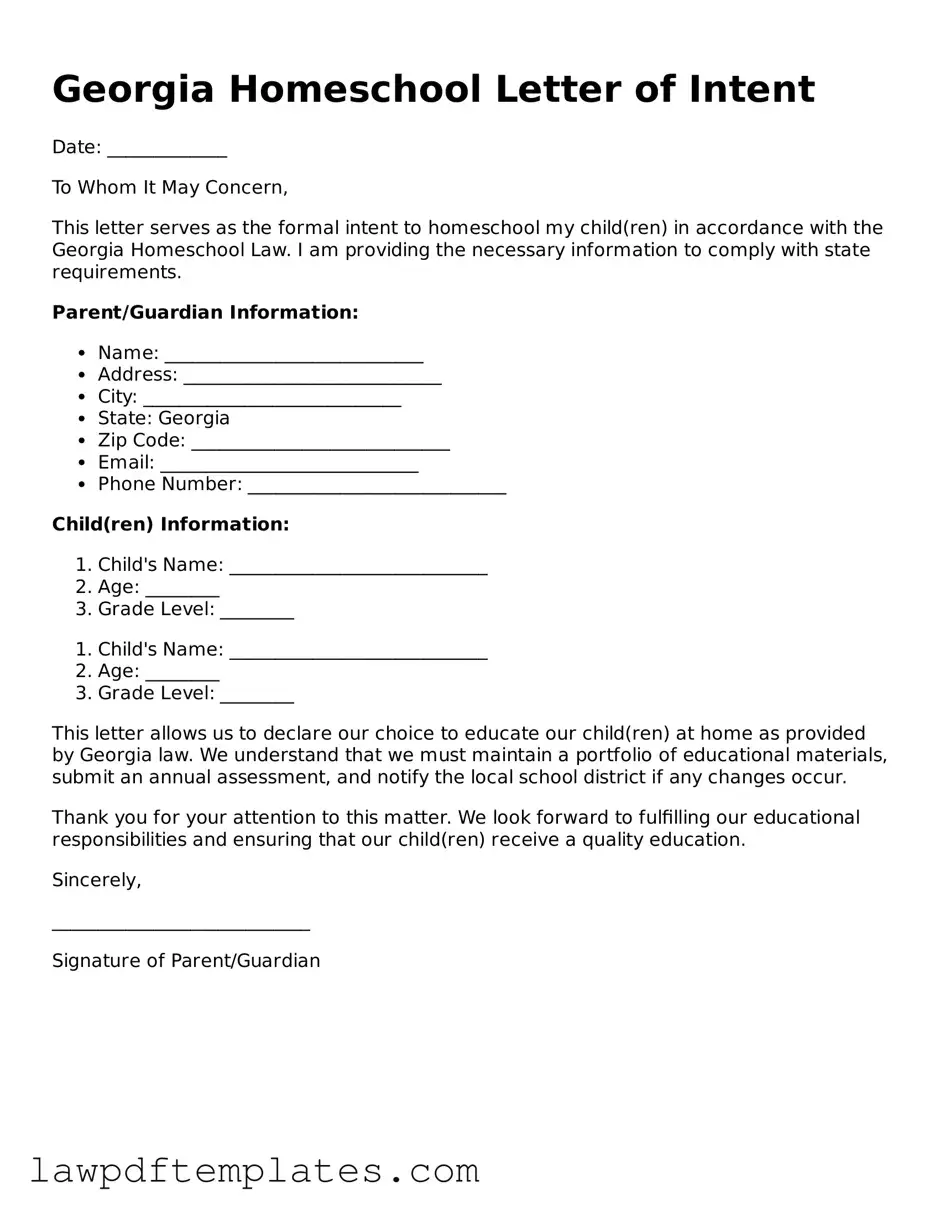Free Homeschool Letter of Intent Template for the State of Georgia
Form Breakdown
| Fact Name | Details |
|---|---|
| Governing Law | The Georgia Homeschool Letter of Intent is governed by O.C.G.A. § 20-2-690.1. |
| Submission Deadline | The Letter of Intent must be submitted within 30 days of beginning homeschooling. |
| Required Information | Parents must include the names, ages, and grades of all children being homeschooled. |
| Annual Renewal | There is no need for annual renewal; the letter is valid until the homeschooling is terminated. |
| Notification to Local School System | Parents must send the completed form to their local school system. |
| Format | The form can be submitted in person or by mail, but electronic submissions are not accepted. |
Sample - Georgia Homeschool Letter of Intent Form
Georgia Homeschool Letter of Intent
Date: _____________
To Whom It May Concern,
This letter serves as the formal intent to homeschool my child(ren) in accordance with the Georgia Homeschool Law. I am providing the necessary information to comply with state requirements.
Parent/Guardian Information:
- Name: ____________________________
- Address: ____________________________
- City: ____________________________
- State: Georgia
- Zip Code: ____________________________
- Email: ____________________________
- Phone Number: ____________________________
Child(ren) Information:
- Child's Name: ____________________________
- Age: ________
- Grade Level: ________
- Child's Name: ____________________________
- Age: ________
- Grade Level: ________
This letter allows us to declare our choice to educate our child(ren) at home as provided by Georgia law. We understand that we must maintain a portfolio of educational materials, submit an annual assessment, and notify the local school district if any changes occur.
Thank you for your attention to this matter. We look forward to fulfilling our educational responsibilities and ensuring that our child(ren) receive a quality education.
Sincerely,
____________________________
Signature of Parent/Guardian
Common mistakes
Filling out the Georgia Homeschool Letter of Intent form can seem straightforward, but many families encounter pitfalls that can complicate the process. One common mistake is not providing the required information. The form asks for specific details about the student and the educational program. Omitting any of this information can lead to delays or even rejection of the application.
Another frequent error is failing to sign and date the form. While it might seem minor, an unsigned or undated form can render the entire submission invalid. It’s essential to double-check that all necessary signatures are included before sending it off.
Some families overlook the importance of submitting the form by the state’s deadline. Georgia law requires that the Letter of Intent be submitted within 30 days of beginning the homeschool program. Missing this deadline can result in complications, including potential scrutiny from local school officials.
Inaccurate information is another critical mistake. Providing incorrect names, addresses, or birth dates can lead to confusion and may require resubmission of the form. It’s advisable to verify all details before finalizing the document.
Additionally, many people fail to keep a copy of the submitted form. Having a record of what was sent can be invaluable for future reference. This can help in case any questions arise or if there’s a need to demonstrate compliance with state regulations.
Another mistake is not including the required educational plan. The form should outline the curriculum and educational approach being used. Without this, local officials may question the legitimacy of the homeschool program.
Some families neglect to inform the local school district of their intent to homeschool. While the Letter of Intent serves as notification, it’s also wise to establish communication with the district. This can help build a positive relationship and ease any concerns they may have.
Many people also underestimate the importance of following up after submission. It’s a good practice to confirm that the school district has received the Letter of Intent. This proactive approach can prevent misunderstandings and ensure that everything is in order.
Another common oversight is not understanding the implications of the form. The Letter of Intent is not just a formality; it signifies a commitment to educating your child at home. Families should take this responsibility seriously and ensure they are prepared for the journey ahead.
Finally, some individuals may not seek guidance when needed. If there are uncertainties about filling out the form or the homeschooling process in general, reaching out to local homeschooling groups or legal experts can provide clarity and support. Taking the time to understand the requirements can save considerable time and effort in the long run.
Discover More Homeschool Letter of Intent Templates for Specific States
Homeschool Kids - A formal indication of your intent to educate your child at home.
Massachusetts Homeschool Curriculum - The letter is a professional communication between parents and educational authorities.
For those looking to finalize their vehicle transactions, the Texas Vehicle Purchase Agreement form is available for easy access and completion through resources like PDF Documents Hub, ensuring that all necessary information is provided to facilitate a clear and binding agreement between the buyer and seller.
Ohio Homeschool Assessment Form - Completing the Homeschool Letter of Intent is a way to affirm your educational choices publicly.
Do You Get Paid to Homeschool Your Child in Florida - Documents the family's educational intent for the child.
